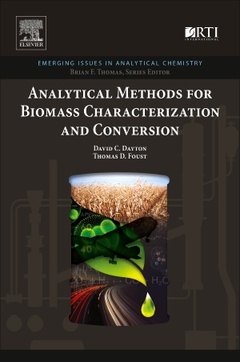Description
Analytical Methods for Biomass Characterization and Conversion
Emerging Issues in Analytical Chemistry Series
Authors: Dayton David C., Foust Thomas D.
Language: English
Subject for Analytical Methods for Biomass Characterization and...:
122.46 €
In Print (Delivery period: 14 days).
Add to cart260 p. · 15x22.8 cm · Paperback
Description
/li>Contents
/li>Readership
/li>Biography
/li>Comment
/li>
Analytical Methods for Biomass Characterization and Conversion is a thorough resource for researchers, students and professors who investigate the use of biomass for fuels, chemicals and products. Advanced analytical chemistry methods and techniques can now provide detailed compositional and chemical measurements of biomass, biomass conversion process streams, intermediates and products. This volume from the Emerging Issues in Analytical Chemistry series brings together the current knowledge on each of these methods, including spectroscopic methods (Fourier Transform Infrared Spectroscopy, Near-infrared Spectroscopy, Solid State Nuclear Magnetic Resonance), pyrolysis (Gas Chromatography/Mass Spectrometry), Liquid Chromatography/High Performance Liquid Chromatography, Liquid Chromatography/Mass Spectrometry, and so on.
Authors David C. Dayton and Thomas D. Foust show how these can be used for measuring biomass composition and for determining the composition of intermediates with regard to subsequent processing for biofuels, bio-chemicals and bio-based products.
- Introduction
- Biomass Characterization
- Biomass Conversion
- Analytical Methods in Biochemical Conversion
- Analytical Methods in Thermochemical Conversion
- Analytical Methods in Hybrid Technologies
- Techno-Economics of Advanced Biofuels Processes
- Lifecycle Assessment of Advanced Biofuels Processes
- Optimized Biofuels for High-Efficiency, Low-Emission Engines
- Alternative Jet Fuels
- Biomass-Based Products and Chemicals
- Waste to Energy
- Carbon Dioxide Utilization for Building Materials, Fuels, Chemicals, and Polymers
- Remaining Challenges and Final Thoughts
Students, professors, scientists, and engineers interested in the production of alternative fuels, chemicals, and products; analytical chemists, chemical engineers, agricultural engineers, biomolecular engineers, energy engineers, and wood and paper scientists
Dr. Thomas Foust is the Director of the National Renewable Energy Laboratory’s National Bioenergy Center (NBC) and a Professor of Mechanical Engineering at Colorado State University. He is a comprehensive expert in the clean energy area with a specialty in bioenergy with over 25 years of R&D and R&D management experience. His areas of expertise in bioenergy include feedstock production, biomass conversion technologies to fuels and products and advantaged uses of biofuels and bioproducts.
- Covers the broad range of techniques and applications that have been developed and perfected in the last decade
- Highlights specific analyses required for understanding biomass conversion to select intermediates
- Provides references to seminal books, review articles and technical articles that go into greater depth, serving as a basis for further study




